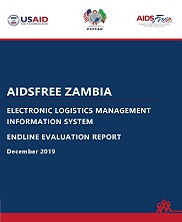The implementation of the electronic logistics management information system (eLMIS) in Zambia started in 2014 with a six-month pilot followed by a nationwide rollout.
The overall objective of this evaluation was to determine the benefits and impact of the eLMIS system on the supply chain of health commodities in Zambia. The study focused on both the eLMIS Central Edition (CE) and Facility Edition (FE).
Key findings include that the timeliness and frequency of reporting increased by endline. There was an overall average improvement in reporting of 12% from pre-eLMIS to endline. Facilities with the FE reported on time 2% more frequently and experienced 15.5 percent fewer stock-outs than similar facilities without FE. In addition, user sessions in the central edition have increased by 37% from midline to endline. District supervisors are using eLMIS to improve stock status at facilities by reviewing stock levels and transferring stocks between facilities to avoid stock-outs and expiries.
Although eLMIS FE has increased supply chain costs, as of 2018, the eLMIS’ program implementation and support over five years coincided with a 15.5 percent increase in commodity availability.
The findings of this evaluation show that despite challenges in the supply chain that led to low order fill rates during the endline, eLMIS has contributed to the general improvement in efficiency, cost, and commodity security. Based on the indicators on commodity availability, stock status, and reporting, a greater proportion of health facilities that have the eLMIS FE were better stocked, reported on time, and achieved a higher frequency of reporting with the two periods of review. 2019.


